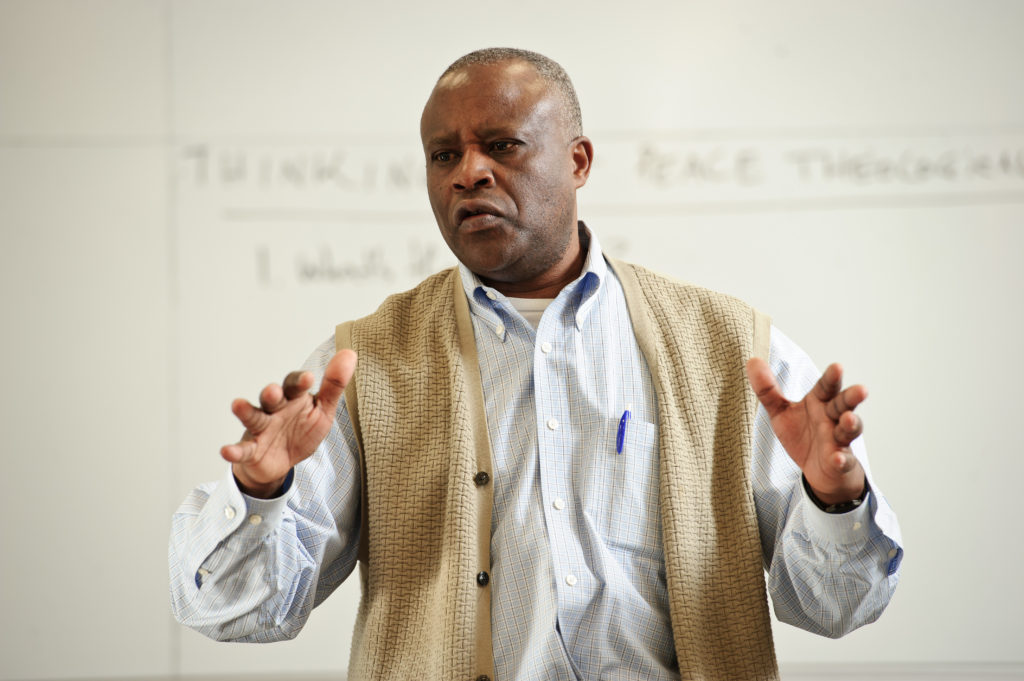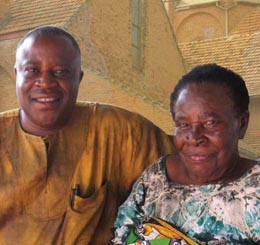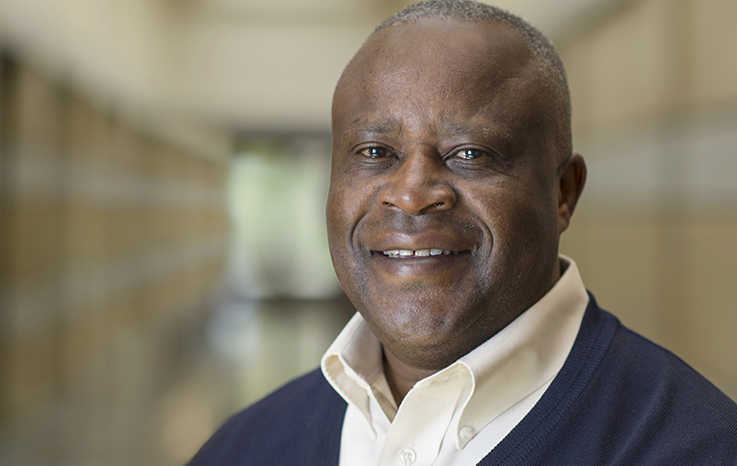
KL: Thanks Emmanuel for sharing with me a bit about your new Contending Modernities project. Just to get us started, tell me, what is this project about and how does it connect to the major themes of Contending Modernities?
EK: “Who Are My People? Christianity, Violence, and Belonging in Sub-Saharan Africa” investigates three types of violence: ethnic violence, religious violence, and ecological violence in Sub-Saharan Africa. The driving assumption is that a crisis of belonging lies at the heart of modern Africa. It is this crisis that manifests itself in violence, which takes these three different forms. How does it connect to the major themes of Contending Modernities? The issues of authority, community, and identity (ACI) are connected to the issue of belonging: who am I? Which is connected to where I locate myself in terms of history, but also in terms community. Especially from an African point of view, belonging is always mediated through a sense of community. So, what happens if one’s identity is inscribed into that crisis of belonging?
By crisis I mean that the way that Africa is brought into modernity and the contact Africa has with modernity generates a sense of being received into modernity while simultaneously being rejected by modernity. By this I mean that Africa’s contact with modernity was framed around perceptions of Africa as savage, backward, primitive; a dark continent. The story that received Africa into modern history is of “nothing good out of Africa.” . And so, whatever is within the African heritage, including traditional forms of belonging, is rejected as part of primitive and savage heritage that has to be left behind if Africa is to become modern, civilized. But even as this “savage” heritage is rejected, it gets to be incorporated within the modernity that is supposed to save Africa. A case in point, if nation-state citizenship represented the modern form of belonging, Africans could only be received within the nation-state as members of a “tribe” (the very notion of belonging that was rejected as “backward”). Thus, one can speak about the “invention” of tribe, as a perpetual feature of nation-statehood in Africa.
As a result, in terms of nation-statehood, there is a sense of both rejection and incorporation, a sense of belonging and not belonging. The irony is that the very forms of traditional belonging that are normatively rejected are at the same time incorporated within the founding story of modern statehood. The widespread phenomenon of “tribal” or “ethnic” violence in Africa cannot be fully understood without this story, and how “tribal” and “ethnic” identity gets to be reproduced and exploited within the power struggles of modern African politics.
What perhaps may not be easily understood is the way the crisis of belonging is reproduced especially through the institutions of modern education and politics. In terms of education, anybody who has ever gone to school within Africa learns the story of “nothing good out of Africa” and so learns to look at the past as primitive, as negative, and as backward. In learning to reject this heritage, they learn to reject themselves and to perceive at themselves as not good, not wanted. Meanwhile, they are standing in the space of modernity trying very desperately to become civilized. But, they can only do so as “African” who inherit a particular tradition, who are for example, a member of a “clan” or “tribe” the very notions that are read as “primitive”. And in relation to politics, as I said, in writing the constitutions of modern Africa, “tribal” identity was foregrounded: the African could only be received within the modern nation-state as a member of a tribe. You see? These orphaned notions are repudiated yet incorporated into the foundational structure of modern Africa. But, if that is connected with this sense of not belonging, not being wanted, and then they incorporate this within the space of modernity; you can already sense the crisis. Critically, this is where I’m going to be doing a lot of research, giving an account of the unique modernity of Africa and how it’s connected to that crisis of belonging in Africa that easily triggers violence in these many forms: ethnic, religious and ecological violence.
KL: I’m interested in your work on belonging. It seems like there is both a critical and constructive edge to that work. Critically, you want to expose the tribalisms that live within modernity that are often concealed: a kind of belonging that requires a rejection of other forms of belonging. But, there is also a constructive account that you’re developing here. Is it a retrieval? An improvisation? What’s the constructive account of belonging you are wanting to develop?
EK: First of all, before I come back to the constructive, the critical work manifests in two ways. First, it is to display that unique modernity of Africa. Second, it is to show that the tensions inherent in this particular form of modernity cause outbreaks of violence. What is unique for me is that for the first time in my research I want to connect ecological violence with the other forms of violence, religious and ethnic violence, and argue that they’re all connected with the same ambiguity of living within this modern space. That’s the critical work.
The constructive work that I’m trying to do is, first of all, to investigate the Christian difference: what difference does Christianity make? Often times religion is implicated in the violence. But I’m going to explore the Christian difference by tracing it through the lives and work of particular individuals and communities that I’ve been investigating. Whether it is Bernard Kinvi in the Central African Republic or Godfrey Nzamujo in Benin who are able to resist that violence, but also, surprisingly, who improvise and invent new forms of belonging within that confluence of violence that is neither traditional nor modern. It’s kind of a bricolage. It’s an improvisation. They are, in a way, grounded in the African reality, but in a way that they reject also the binaries, the either or. So, they draw positive insight from African tradition and positive insight from modernity, and they are able to weave and create new forms of community, nonviolent forms of community. So those are the kind of people I want to explore, and study what is at work in their lives.

KL: I know across your work you’ve engaged questions of African political theology that relate to your biography. But this work in particular, though an academic work, is deeply personal. As your title suggests, you’re asking a question about your communal identity which is in some ways a question of who am I? And how do I fit within this construction of African modernity? I wonder how this project is emerging from your own history and identity? And how does it integrate also your diaspora status here at Notre Dame?
EK: That is the motivating, and I think in the final analysis will also be the framing, story of the book. My own identity: who are my people? I go back to the story of the 1994 Rwandan genocide and the violence of it, that is when these questions emerged for me. I know that I’m a Ugandan, but my parents migrated from Rwanda: one is Hutu, the other is Tutsi. So, I looked at the bodies in the aftermath of the violence and said, “Oh my goodness. Which side am I on?” I’m unable to tell.
But that has been compounded over the years as I have traveled and stayed in Europe for six years and America now for fifteen or so years. So, am I African? Am I American? Am I Ugandan? Am I Rwandan? Am I Hutu? Am I Tutsi?
I think that what has been revealed in all of that is a sense of coming together of the different facets of my identities – and what I have learnt over the years in terms of the possibilities and challenges of inhabiting more than one identity, of belonging to more than one community. I’m going to use the notion of the Ephesian moment—the coming together of the fragments that Paul talks about in the letter to the Ephesians when Jews and gentiles shared for the first time the meal table thus giving rise to a new fellowship—as the theological framing lens. I will draw upon what I have learnt from my own journey throughout the years about these Ephesian moments from a theological point of view. That’s why my own biography is at stake here.
The different people that I will be investigating within the context of narrating religious, ethnic and ecological violence display some of the bringing together of fragments that used to be far apart. “The dividing wall has been broken,” as Paul writes in Ephesians. A New community has emerged through the act of Jews and gentiles “eating together.” I read that as the quintessential ecclesiological moment, that coming together. So what these people are doing is performing dimensions of church, as God’s new people; the church not so much as an institution but as an event, an Ephesian moment.
But, it’s really framed through my own story. Or, maybe the driving motivation is connected to my own story, my own sense of diasporic presence, of not able to tell clearly who my people are, because even people I originally thought were “strangers” have come to be part of “my people.” I’m really excited about that as well.
KL: Thank you, Emmanuel, for telling me a bit about this project. I share your excitement and look forward to hearing more as your research proceeds.

